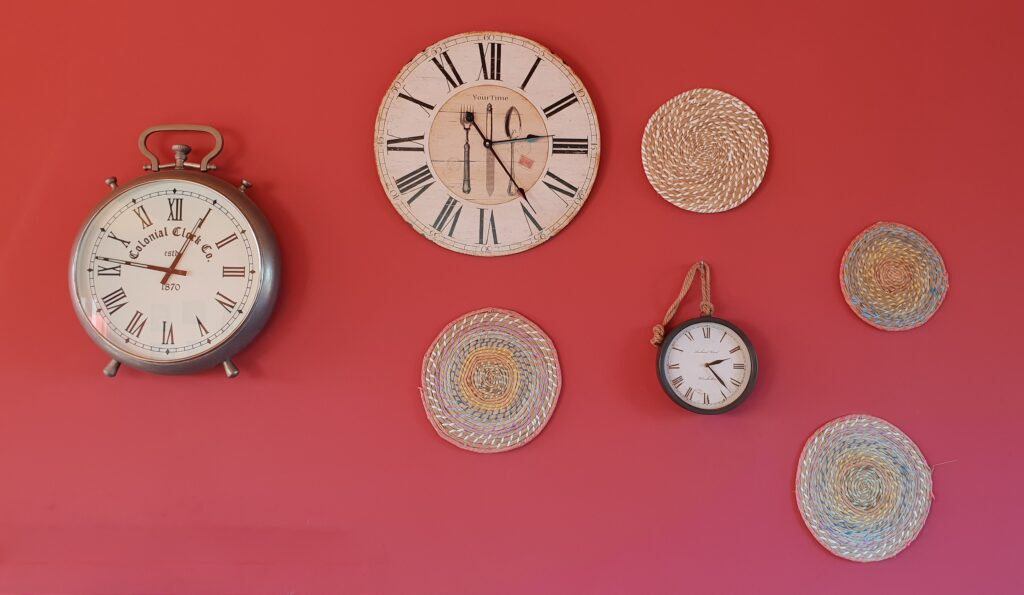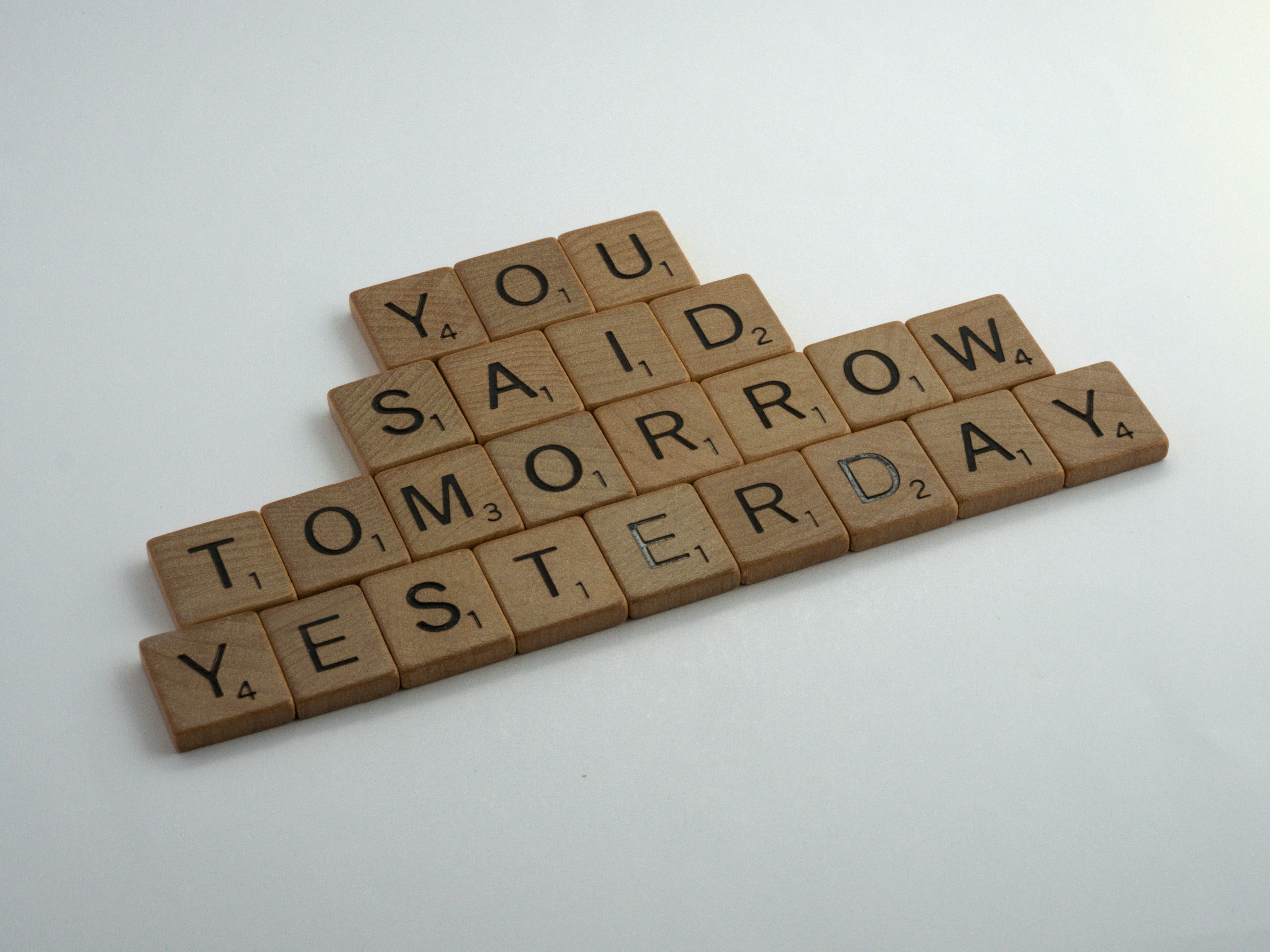Are you guilty of procrastination? Do you wait until the deadline to finish an assignment?
As the days tick by, do you sit there knowing very well that you could get started working on your goal or project, but don’t?
Do you distract yourself with other chores or low priority tasks rather than working on what you need to be doing?
This is called procrastination. And it causes stress while you are not doing what you know you should be doing. In the end, this stress causes us to be irritated and unhappy.
But why do we self-sabotage and do this to ourselves? How can we correct this behavior and better our thought process so we can take care of what we need to do then and there and free ourselves up to live our lives?
We will look at the potential reasons behind why you might procrastinate in this post. However, regardless of the reason, procrastinating will ultimately make you stressed and unhappy.
Don’t put off until tomorrow what you can do today.
Benjamin Franklin
Why procrastination feels so bad
No one says they like to procrastinate. Usually, people describe procrastination as an illness or an addiction they can’t seem to rehabilitate from.
This is because procrastination doesn’t feel good. So, if it doesn’t feel good, it can’t be a good thing. We can listen to ourselves and know when something is bad for us and our life.

The classic procrastination setting
You are working on a project and it is estimated that it will take about six weeks to comfortably complete. You want to complete it with a high standard and you have mapped out what you should accomplish each week to do this.
However, each day goes by and you don’t work on the project. Soon, a week has gone by, and instead of starting, you re-map out what you need to accomplish in the shortened timeframe. You see that you can still do it and you calm yourself down.
But each night, as you fall asleep, you are awakened with worry. You wonder what if you can finish on time since you’ve used up all the cushion time that was meant for unforeseeable delays. As the days continue to tick down, when you are doing something during the day that doesn’t have to do with the project, you think about how you should be working on it.
It hangs over your head day and night so you can’t actually enjoy a good night’s rest or your favorite show.
Procrastination feels bad because you know mentally you should be taking care of something that you are not. You may be giving yourself short-term and immediate pleasure by choosing to scroll through Instagram rather than work on your presentation but you are making yourself unhappy in the long term by not taking care of your responsibility now.
And you know it’s going to come back and bite you in the butt. You know what you should do and you know that you are not doing it. You are procrastinating. This dissonance hurts your brain and makes you feel bad.
What’s the reason behind why you procrastinate?
People procrastinate for different reasons. The reason or reasons behind why you procrastinate can help you better address your procrastination.
If you think you procrastinate because you are lazy, that’s not necessarily true. There’s a lot more going on than just not wanting to do the work.
Tim Urban, a blogger of Wait But Why, has a humorous Ted Talk about what’s going on in the mind of a procrastinator. If you want the truth and a good laugh, watch his talk.
You like the rush
This is especially true if it’s a task that is not that interesting to you. But you can do this even if it is about something you are passionate about.
You know that the days leading up to the deadline can build stress. Sometimes, we are addicted to the rush of completing something last minute with a shorter timeframe than believed possible and, yet, still somehow managing to pull it off.
This can, unfortunately, feedback to our mind that being last minute is alright and, without any punishment, we can be fooled into being encouraged to do this again.
Coupled with the dopamine from the exhilaration of this last-minute work, we become addicted to procrastination.
You are a perfectionist
Although you may be a perfectionist, you don’t have to be one to fall into this category. You can be anxious, fear failure, fear a negative evaluation, or feel out of control.
This can coincide with an issue with dealing with your negative thoughts. When you start to work on something, you may experience doubt and even an inner voice that tells you ‘you don’t know what you are doing’ and ‘you’re not going to do it well’.
This feels extremely uncomfortable. You think “if I can’t do this well, I might as well not do it”. So, you avoid it and get too scared to start.
In this case, you have to learn to deal with the negative thoughts and counteract them by addressing them. When the thought bubbles up that ‘you can’t do this well’, you tell it ‘This is new to me; I am still learning; I will do my best and that is good enough’.
Even if you aren’t a perfectionist, you can still be a person who negatively deals with the struggle it takes to complete a task. Therefore, you avoid it and by doing so, procrastinate.
You are bored or can’t see the end-goal
This may have to do with the task or the way the assignment is set up itself rather than you. But you can do something about this.
There are goals that seem too far off in the future or are abstract like working to be successful. What exactly does that mean and how are you going to get there?
You may not feel passionate about the task and subsequently procrastinate working on it. However, even though you may not be motivated to work on the task because you feel it’s boring, you can incentivize yourself. You can look further out and see that successfully completing the task would mean a reward like a raise or a good grade that you do care about.
It is then important to clearly look at the assignment and figure out why you need to do it. Will the result be satisfying? Will finishing it mean you will get more money, will it give you fame, or will it make you feel proud of yourself? Then, don’t forget to remind yourself of this motivation as you set out to work on it.
On the other hand, you may not be bored, but overwhelmed and not know where to start so you avoid the task altogether. You may be trying to move out of your apartment and realize there’s so much stuff to pack and you can’t see how you are going to get it all done.
Again, it’s best to take a step back, remind yourself of your concrete goal, and break the task into chunks. You can even have a friend or family member help you take a fresh look at what you are doing.
Why you can’t seem to stop procrastinating
Even when people have the awareness that they procrastinate, they still don’t stop. It becomes a part of their character traits. “They are a procrastinator.”
We allow ourselves to get distracted while we avoid doing what we need to do. Take away your distractions or limit these distractions like looking at your phone, watching a show, or foraging for snacks.
Another reason why we can’t stop is that we won’t admit to ourselves that we are procrastinating. If this is what you are doing, go back to the section above to figure out why you are doing this, and face it. Call yourself out and then, most importantly, forgive yourself for messing up.
While we are in our negative thoughts which make us feel uncomfortable and hold us back from improving and making progress, we then beat ourselves up for repeating history and for putting ourselves in this position because we procrastinated.
The negative cycle won’t end until we practice self-compassion and forgive ourselves for being human. Today is a good day to start. Now, is the best time. Because since we can’t time travel back to the past, there’s no use in lamenting about it.
Stop putting things off, start living in the now

While we waste our time hesitating and postponing, life is slipping away.
Seneca
We need to learn to enjoy the process. Procrastinating puts our life on pause. It doesn’t allow us to fully enjoy what we are doing because the thing which we should be working on is looming in the back of our minds.
People procrastinate on more than just assignments and responsibilities, but also on doing or getting what they want. How often do people put off taking a vacation to a place they have always wanted to go? Or ask the person they like out on a date?
We procrastinate on doing what would make us happy, putting things off into the future what is uncertain when we could enjoy it now.
Live happier,
Nicole
Let me know what you think by commenting below! Learn more about me, the author, here.
Disclaimer: This post contains Amazan Affiliate links.
Share this post with others!
Related posts:
- Dealing with Uncertainty
- Motivation: Use it to Succeed in Your Endeavors and be Happier
- The Right Mindset, According to Simone Biles

5 replies on “How Procrastination Leads to Stress and Unhappiness”
I am guilty of procrastinating now and then. And I think we all are sometimes. I think you made some great points on your post. Unfortunately, most of the times we procrastinate doing what we truly want due to fear of failure. Some others due to lack of self trust and sometimes because we think we do not deserve something.
You’re right we all procrastinate at times and that doesn’t necessarily make us a procrastinator. You also bring up some good points that on one hand we can procrastinate due to fear of failure and on the other hand due to fear of success and what that will mean for us. Procrastination is basically a struggle with ourselves. Thank you for reading my post!
Very very detailed and nice. It’s easy to procrastinate and get distracted. I think the biggest reason is social media versus work. Good insights. Xx
Isa A. Blogger
Thanks for reading my post! Haha you’re right that the most likely distractor is social media. We have to work on our discipline in that case.
[…] How Procrastination Leads to Stress and Unhappiness […]